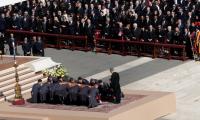ADEN: The leader of Yemen’s southern separatists has warned against the looming collapse of a power-sharing deal, saying the region is menaced by the twin threats of economic catastrophe and Islamist attacks.
The agreement to resolve a battle for control in the south, which was signed in Riyadh last November, was hailed as a step towards ending the wider conflict in Yemen that pits the government against Iran-backed Huthi rebels.
However, analysts have said it is effectively defunct, having failed to meet deadlines for key measures including the formation of a new cabinet with equal representation for southerners, and the reorganisation of military forces.
In an interview with AFP, Aidarous Al-Zoubeidi, who heads the secessionist Southern Transitional Council (STC), said he was committed to the deal “under the leadership of Saudi Arabia” which leads a military coalition against the Huthis.
Zoubeidi said the agreement, which observers had welcomed as preventing the complete break-up of Yemen, united the south against the Huthis and recognised the STC as a legitimate party.
“We consider the Riyadh Agreement an important political step, because we gained regional and international recognition,” he said as he sat behind his desk in the main southern city of Aden in front of the flag of the formerly independent south.
In August, deadly clashes broke out between the government and STC forces who seized control of Aden, ousting unionist forces who had set up base there when President Abedrabbo Mansour Hadi fled the Huthi-held capital Sanaa in February 2015.
While the government and the STC are technically allies in the long war against the Huthis, the secessionists believe the south should be an independent state – as it was before unification in 1990.
People queue to enter St. Peter's Basilica to pay respects as Pope Francis lies in state, as seen from Rome, Italy,...
UK minister Rachel Reeves. — AFP/FileBERLIN: A top German diplomat has said he is “really optimistic” that...
Ana Toni, Brazil’s chief executive of the Cop30 summit. — Reuters/FilePARIS: Europe is “absolutely vital” to...
This handout photo taken and released by the Royal Thai Police on April 25, 2025, shows Thailand's national police...
Then-Senator Fernando Collor de Mello, also a former Brazilian president, during a vote session on the impeachment of...
Debris of the house of Adil Thokar, allegedly linked to the Pahalgam terror attack, that was demolished in Bijbhera,...







